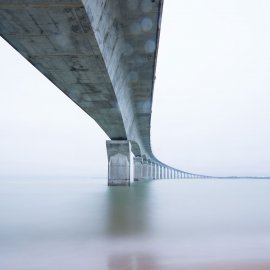Bridges
-
English
-
ListenPause
[intro music] Welcome to World Ocean Radio… I’m Peter Neill, Director of the World Ocean Observatory. I’ve been thinking about bridges. Engineered structures: triumphs of ingenuity by which to connect things, one side to another, by stone and steel and wire, floating and suspended. Bridges are symbols: the Brooklyn Bridge in New York for example, used to distill and focus on the achievement not just of the designers but also the men, the builders, underwater in caissons laying the foundations, or spinning the wire into cables from which the connection is hung, raised to a metaphor for work, achievement, and aspiration, a reconciliation of communities and nations -- the stuff of geopolitics and poetry. It is no secret that we live in an era of disconnection. We oppose worldviews and beliefs – on climate and science. While the ocean seems much like a vast separation, it nonetheless connects through trade, immigration, and the passage of ideas that therefore serves to bridge. The convincing harmony, however, seems missing. Recently I have been presenting on opposite points of view – specifically the antipodes, the juxtaposition of the Arctic and Antarctic as the poles, indeed axis, on which the Earth turns. North to south, land to water, settled to unsettled – and yet unified by the changing circumstance of climate, pollution, and disruption. Both are faced with deteriorating change: in the atmosphere, on land and the icy edges, and into the water column where still exists an abundance of life and resources mostly untouched by the anthropogenic impacts of what we call civilization. What is the bridge between them? We are living on the span, out on the arc of history, of the record of our successes and failures, of our capacity to grow and thrive and survive, and of our ability to reach the other side without collapse – not just for some of us, but for all. If we are half-way out, how do we get to the other side? Sailors knew the point of no return, when the way forward was imperative as the way backward was impossible. Explorers had no such decision point, in that they did not know what lay ahead in the unknown, uncharted water where only the prospect of knowledge and wealth provided the certainty to continue. Perhaps today our goals our different, as the world is parsed and known, albeit the lure of wealth remains -- half-way out, but the future unknown and the sense of monsters in the margins, collapse, and apocalypse no longer the realm of science fiction. Is this a bridge to nowhere? We are caught between despair and hope. In his conclusion to 21 Lessons for the 21st Century, Yuval Noah Harari writes about the confrontation of truth to power and our choice now between application of mind and body to resistance and re-invention and the subversion of our freedoms to technology, autocracy, and social disorder. “For a few more decades,” he writes, “we still have a choice. If we make the effort, we can still investigate who we really are. But if we want to make use of this opportunity, we had better do it now.” Do it now. Standing on the bridge I feel this urgency to move forward, to broaden and amplify every effort to clear the way across by advocating and doing all required to protect and sustain the world ocean. It’s a huge obligation, and no one voice in print or on the radio can succeed without so many more. This month, World Ocean Observatory surpassed 800,000 followers on Facebook alone, part of a relentless campaign via social media and various forms of communication designed to build and sustain a global community of “Citizens of the Ocean,” the millions of us who live by and depend on the ocean-fresh water cycle and who see the other side as place for natural, political, financial, and social connection. We must cross over the bridge to the future – with courage, determination, and the assurance of success. We are not alone. Make your choice. Step out. Cross over. The other side awaits. We will discuss these issues, and more, in future editions of World Ocean Radio. [outro music]
Bridges are physical structures born from the ingenuity and hard work of humankind, engineered to connect things from one side to another. Bridges are also symbols and metaphors. This week on World Ocean Radio host Peter Neill muses about the bridge between despair and hope, between resistance and reinvention, between past and future. In this episode he encourages us to have the courage and determination to cross over to the other side where a sustainable future awaits.
Do you prefer the written word? Head on over to Medium.com/@TheW2O.
About World Ocean Radio
World Ocean Radio is a weekly series of five-minute audio essays available for syndicated use at no cost by college and community radio stations worldwide. Peter Neill, Director of the World Ocean Observatory and host of World Ocean Radio, provides coverage of a broad spectrum of ocean issues from science and education to advocacy and exemplary projects.
Image
Rivedoux-Plage, Charente-Maritime, southwestern France
Credit
Sweet Ice Cream Photography
- Login to post comments



